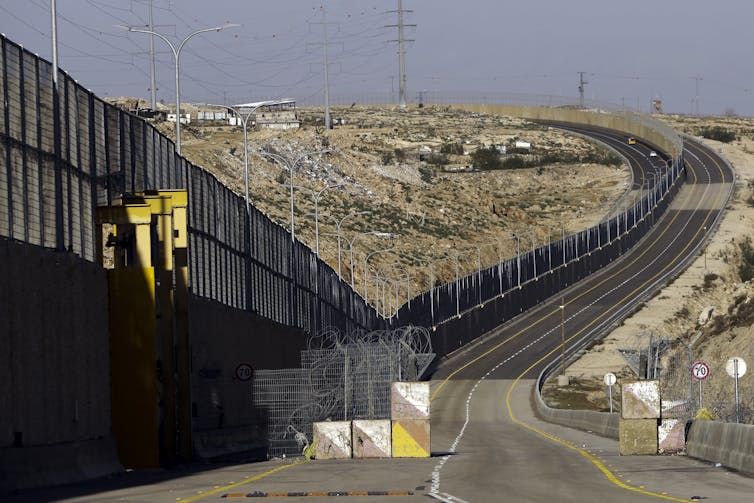Netanyahu may be ousted but his hard-line foreign policies remain
- Written by David Mednicoff, Chair, Department of Judaic and Near Eastern Studies, and Associate Professor of Middle Eastern Studies and Public Policy, University of Massachusetts Amherst
After two years of repeated and inconclusive Israeli elections, the advent of a new coalition government[1] has ended the long era of Benjamin Netanyahu’s prime ministership. Yet he leaves a legacy of hawkish policies that will likely remain intact.
As a scholar of Middle Eastern politics[2], I think that Netanyahu will largely be remembered internationally for three things. These are stymieing the emergence of a Palestinian state[3], enhancing Israeli military strength[4] and opposing Iranian power[5] in the Middle East.
 Israel’s new prime minister is Naftali Bennett.
AP Photo/Ariel Schalit[6]
Israel’s new prime minister is Naftali Bennett.
AP Photo/Ariel Schalit[6]
Distancing Palestinians
Netanyahu, known as “Bibi” to most Israelis, was prime minister from 1996 to 1999. He returned to power a decade later. He began his first term as prime minister in 1996 with two main qualities – extensive U.S. experience[7] and a record as a security hawk[8].
The first quality meant he understood American politics and interest groups well, an advantage for keeping and enhancing strong U.S. government support[9] for Israel.
The second set him up for success in a country in which the army is a key – and revered – national institution[10].
Netanyahu pledged to avoid compromising with Palestinians[11] in the West Bank and Gaza areas under Israeli military control since 1967, and he allowed rapid expansion of Jewish settlements[12] in the West Bank. He rarely wavered from these two policies.
His party was voted out in 1999 but returned to power amid the Palestinian uprisings[13] that began in 2000. After nearly a decade in and out of Likud government cabinets, he became prime minister again in 2009.
Among his most tangible legacies is the physical barrier now separating West Bank Palestinians from Israelis[14], which gives Israeli authorities great control over how West Bank Palestinians enter Israel.
The barrier has kept Israeli Jews from much contact with Palestinians other than during military service.
This physical separation and a strong Israeli military presence have decreased Palestinian attacks within Israel[15] and increased misery in Palestinian-controlled areas[16].
His approach limited pressure on Jewish Israelis[17] to make a final deal that would trade occupied land for broader peace. It also deprived Palestinians of basic liberties and opportunities, particularly in Gaza[18].
 This West Bank highway segregates Israeli and Palestinian traffic with a concrete wall.
AP Photo/Mahmoud Illean[19]
This West Bank highway segregates Israeli and Palestinian traffic with a concrete wall.
AP Photo/Mahmoud Illean[19]
Reinforcing security
Long-term massive U.S. foreign aid and military assistance[20] and Netanyahu’s support have ensured that Israel’s army is far more powerful[21] and well-equipped than the armed forces of any other nearby country.
Netanyahu used this formidable military to strike hard when he deems necessary in Gaza[22], the area between Israel and Egypt that Israel unilaterally returned to Palestinian control in 2004. Hamas[23], a Palestinian group that advocates military action against Israel, is in charge of Gaza.
Reflecting the sentiments of a growing number of right-wing Jewish Israelis[24], Netanyahu has had a generally consistent response[25] to ongoing concerns about Hamas, and Palestinians more generally. Israel, he argued, awaits Palestinian concessions that Israel is a Jewish state[26], with Jerusalem as its capital, and with no right for Palestinians to return to their pre-1948 homes in Israel.
Many Palestinians find these conditions unfair[27] in general, particularly as a precondition to negotiations.
Coupled with his government’s vast expansion[28] of Jewish settlements in the West Bank[29], many veteran observers doubt that a two-state solution[30] to the Israeli-Palestinian standoff remains possible. At the same time, major violence in May 2021[31], which embroiled Palestinians and Israelis in Gaza, Israel proper and the West Bank, has served as a reminder that the conflict still matters.
Netanyahu also sought relentlessly to curb Iran’s efforts to enhance its power through funding pro-Tehran militant groups[32] in the Middle East.
Tehran’s leaders are unremittingly hostile towards Israel[33]. Yet Netanyahu has played up this hostility to domestic and international audiences, even urging the U.S. to attack Iran[34].
The prime minister’s anti-Iranian campaign apparently paid off when the U.S. government withdrew from the multilateral nuclear agreement with Iran that the Obama administration negotiated. Netanyahu claims[35] that he persuaded President Donald Trump to back out.
 Israelis celebrate a new government on June 13, 2021.
AP Photo/Oded Balilty[36]
Israelis celebrate a new government on June 13, 2021.
AP Photo/Oded Balilty[36]
Reshaping Israeli alliances
Undermining Palestinian statehood, bolstering the military and countering aggressively the Iranian threat have had three important ramifications.
First, Israeli and American Jews have diverged[37] increasingly on the ethics and importance of Palestinian autonomy.
Second, the prime minister’s long time in office and his willingness to fan flames of bigotry[38] have endeared him to other rulers who embrace authoritarian or divisive tactics, such as Russian leader Vladimir Putin[39], Hungarian Prime Minister Viktor Orbán[40] and Trump[41].
Third, Netanyahu’s political longevity and positions have attracted the cautious recent support of key Arab leaders who seem more concerned about their stability and Iran’s politics than a Palestinian state.
[Like what you’ve read? Want more? Sign up for The Conversation’s daily newsletter[42].]
Thus, Egypt[43], Saudi Arabia[44] and the United Arab Emirates[45] have growing levels of cooperation with Israel. This trend expanded under Trump[46], leading to the 2020 Abraham Accords, which Netanyahu incorrectly thought[47] would further sideline the Palestinian problem.
Netanyahu reshaped Israel and the broader Middle East in profound ways. It’s clear that the country’s military capacity and cooperation with the region’s wealthy Arab states have expanded. But I have seen for several years the darker side of the former prime minister’s emphasis on military solutions in the erosion of global support for Israeli politics and deteriorating conditions for Palestinians.
This is an updated version of an article originally published March 4, 2019[48].
References
- ^ new coalition government (www.reuters.com)
- ^ scholar of Middle Eastern politics (www.umass.edu)
- ^ stymieing the emergence of a Palestinian state (www.cnn.com)
- ^ enhancing Israeli military strength (nypost.com)
- ^ opposing Iranian power (slate.com)
- ^ AP Photo/Ariel Schalit (newsroom.ap.org)
- ^ extensive U.S. experience (www.jewishvirtuallibrary.org)
- ^ security hawk (www.bbc.com)
- ^ keeping and enhancing strong U.S. government support (www.commentarymagazine.com)
- ^ army is a key – and revered – national institution (jewishstudies.washington.edu)
- ^ compromising with Palestinians (www.vox.com)
- ^ Jewish settlements (www.npr.org)
- ^ Palestinian uprisings (www.britannica.com)
- ^ physical barrier now separating West Bank Palestinians from Israelis (blogs.ei.columbia.edu)
- ^ decreased Palestinian attacks within Israel (www.johnstonsarchive.net)
- ^ increased misery in Palestinian-controlled areas (news.un.org)
- ^ limited pressure on Jewish Israelis (www.pcpsr.org)
- ^ particularly in Gaza (www.bbc.com)
- ^ AP Photo/Mahmoud Illean (www.apimages.com)
- ^ massive U.S. foreign aid and military assistance (www.everycrsreport.com)
- ^ Israel’s army is far more powerful (nationalinterest.org)
- ^ strike hard when he deems necessary in Gaza (www.usatoday.com)
- ^ Hamas (www.bbc.com)
- ^ growing number of right-wing Jewish Israelis (doi.org)
- ^ response (www.haaretz.com)
- ^ Israel is a Jewish state (theconversation.com)
- ^ Palestinians find these conditions unfair (carnegieendowment.org)
- ^ his government’s vast expansion (www.nytimes.com)
- ^ Jewish settlements in the West Bank (www.vox.com)
- ^ two-state solution (www.momentmag.com)
- ^ major violence in May 2021 (slate.com)
- ^ funding pro-Tehran militant groups (docs.house.gov)
- ^ unremittingly hostile towards Israel (www.brookings.edu)
- ^ urging the U.S. to attack Iran (www.reuters.com)
- ^ Netanyahu claims (www.newsweek.com)
- ^ AP Photo/Oded Balilty (newsroom.ap.org)
- ^ Israeli and American Jews have diverged (theconversation.com)
- ^ willingness to fan flames of bigotry (forward.com)
- ^ Russian leader Vladimir Putin (www.jpost.com)
- ^ Hungarian Prime Minister Viktor Orbán (www.independent.co.uk)
- ^ Trump (www.haaretz.com)
- ^ Sign up for The Conversation’s daily newsletter (theconversation.com)
- ^ Egypt (www.jpost.com)
- ^ Saudi Arabia (www.bbc.com)
- ^ United Arab Emirates (www.middleeasteye.net)
- ^ expanded under Trump (theconversation.com)
- ^ leading to the 2020 Abraham Accords, which Netanyahu incorrectly thought (www.usnews.com)
- ^ article originally published March 4, 2019 (theconversation.com)
Read more https://theconversation.com/netanyahu-may-be-ousted-but-his-hard-line-foreign-policies-remain-162580
















